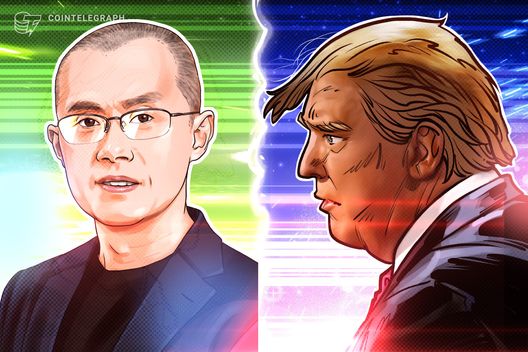

The crypto world often finds itself at the intersection of innovation, regulation, and high-stakes politics. Recently, a statement from former President Donald Trump sent ripples through the digital asset community, reigniting debates about the nature of financial compliance in the blockchain era. Referring to the pardon of Binance founder Changpeng "CZ" Zhao, Trump reportedly claimed, "I'm told what he did is not even a crime." This assertion not only challenges the very premise of CZ’s conviction but also underscores a growing chasm between traditional legal frameworks and the rapidly evolving crypto landscape.
Context of CZ's Case and the Pardon
To understand the weight of Trump's comment, it's crucial to revisit the circumstances surrounding CZ. The founder of the world’s largest cryptocurrency exchange, Binance, was embroiled in a protracted legal battle with U.S. authorities. Ultimately, CZ pleaded guilty to failing to maintain an effective anti-money laundering (AML) program and agreed to a substantial personal fine and a prison sentence. His conviction, while not for direct fraud or embezzlement, centered on the exchange's alleged lax compliance that allowed illicit funds to flow through its platform. The subsequent pardon, a move of significant political and economic consequence, brought his legal ordeal to a premature end, sparking varied reactions across the globe.
Trump's "Not a Crime" Stance
Trump's remark, sourced from unnamed advisors, suggests a particular interpretation of financial transgressions within the crypto space. It implies that CZ's actions, while perhaps non-compliant with existing regulatory mandates, might not inherently constitute criminal intent or traditional financial malfeasance in the eyes of some political figures. This perspective could stem from a fundamental disagreement on how to classify the failures of a nascent industry operating in a global, decentralized manner versus established banking institutions. Such a view, if adopted more broadly, could significantly influence future U.S. policy towards digital assets and their founders, potentially leading to a more lenient or altogether different regulatory approach.
CZ's Vision for America as a Crypto Hub
Following the monumental pardon, CZ himself expressed an ambitious vision for the United States.
Following the pardon, CZ said he would do “everything we can to help make America the Capital of Crypto and advance Web3 worldwide.”
This statement underscores a desire to turn a new page and contribute positively to the U.S. crypto ecosystem. It also highlights the strategic importance of the U.S. in the global Web3 movement. With renewed freedom, CZ, a figure of immense influence and expertise in blockchain technology, could potentially play a significant role in shaping the nation's posture on crypto regulation and innovation.
Implications for Crypto Policy and the Future
Trump's comment and CZ's subsequent pledge carry profound implications. On one hand, the "not even a crime" narrative, if gaining traction, could signal a shift towards a more crypto-friendly political environment in the U.S., particularly concerning enforcement actions against blockchain entrepreneurs. This could attract more crypto innovation and investment, potentially positioning the U.S. as a global leader in digital assets, aligning with CZ's stated goal.
However, it also raises questions about accountability and the effectiveness of existing AML frameworks. If failures to comply with money laundering laws are dismissed as non-crimes, it could create dangerous precedents, undermining efforts to safeguard the financial system from illicit activities. The interplay between political rhetoric, regulatory enforcement, and the evolving nature of financial crime in the digital age will undoubtedly remain a focal point as the crypto industry matures.
Conclusion
The narrative around CZ’s pardon and Trump’s accompanying statement paints a complex picture of the ongoing struggle to define and regulate the crypto industry. It highlights the political dimensions of crypto policy and the differing interpretations of what constitutes a "crime" in a rapidly innovating sector. As the U.S. contemplates its role in the global Web3 revolution, the perspectives articulated by figures like Trump and CZ will undoubtedly shape the future trajectory of digital asset regulation and America’s ambition to become the true "Capital of Crypto."
Keywords: Trump, CZ, Binance, crypto regulation, pardon, money laundering, financial crime, digital assets, Web3, US crypto policy, blockchain, crypto ecosystem, crypto innovation, digital asset regulation
